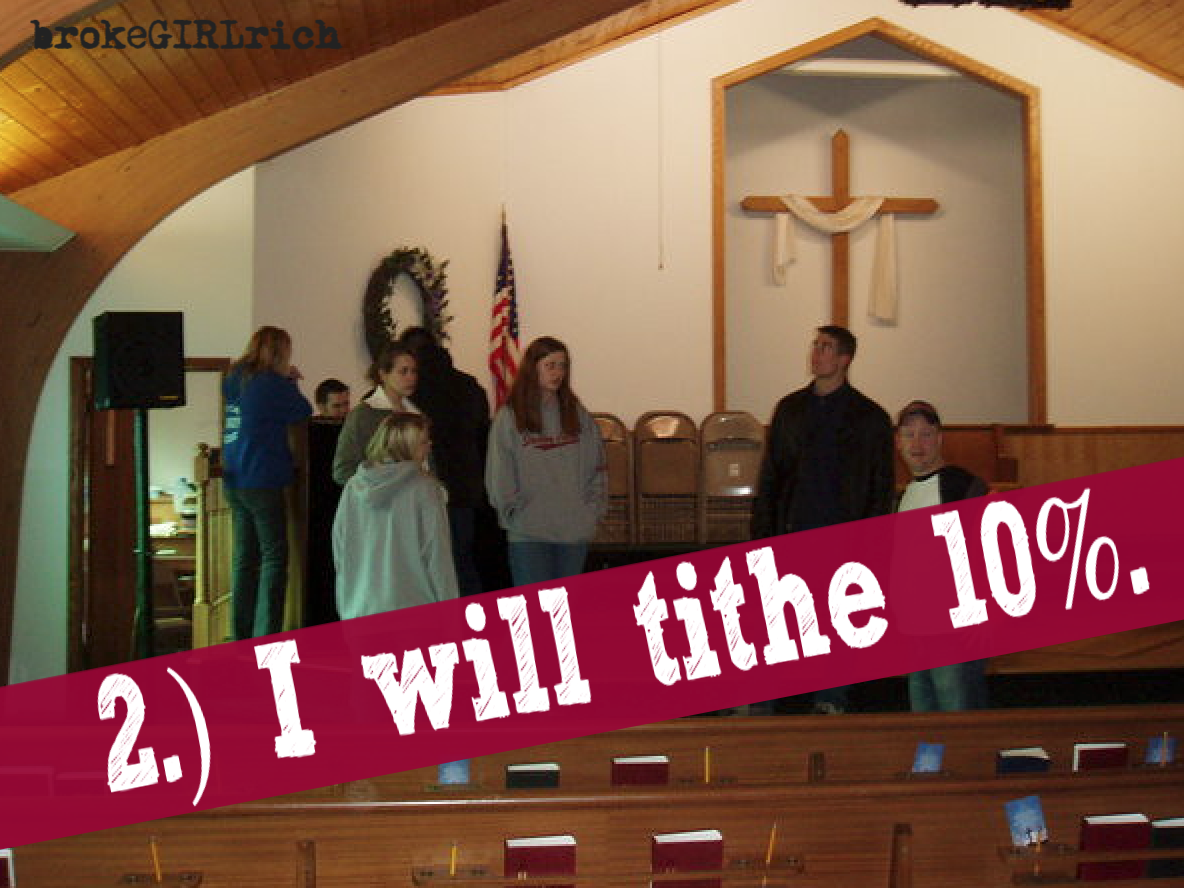
2.) I will tithe 10% | brokeGIRLrich
I will stay that, for me, reviewing my Money Manifesto, this was one of the things that stood out to me and made me think a lot about how my relationship with religion has changed since 2014.
I am still hardcore Team Jesus but the state of organized religion is fairly terrifying. The thing that constantly boggles my mind the most about so much of the current views of the American Church, is like how are we not legitimately terrified to meet Jesus one day with a lot of the choices being made?
The only logical conclusion to me is that they must not believe He’s real?
I mean, it’s a fairly radical faith where we’re called to put God first, others second and ourselves third and I don’t see a lot of evidence of this in America anymore.
I am well aware I fail at this every day, but also… I’m aware I’m failing, for whatever that’s worth.
And the point of that rant is really to point out that I haven’t belonged to a specific church in years so the tithing 10% thing… isn’t a thing.
I do try to make sure 10% of what I make goes to charity. It just seems that something like a GoFundMe or a charity providing water and medical services to areas that don’t have them is a way better use of money than helping to pay the rent on a building or buy moving lights for a megachurch.
Some of the charities are Christian organizations doing those things and I’m all for folks saying “yup, I gave up an easy life to live in this crazy area and help teach you how to drill wells because of Jesus, so now let’s get to how to drill a well.” Tangible acts of love go a lot further than “thoughts and prayers” – which I think are a pile of garbage without any action.
This isn’t to say there aren’t moments where the only action left is prayer, because… that’s a thing, but I do think if there’s anything you can be doing in a bad situation, that’s what you should be doing as well. You don’t just bury your Talents in the dirt, you do something with them.
I also have a strong preference for charities that support indigenous missions efforts, meaning that rather than doing things for people, you provide them with what they need to learn how to do something and then leave them to implement it in their communities in ways that make sense to their native cultures.
I was really lucky to have an amazing missions professor in grad school who emphasized over and over again the damage we often do as Westerners in a lot of communities and who gave some really compelling evidence about the pointlessness of short term missions. I was blatantly shocked he was allowed to teach at our super conservative school because I thought he was brilliant and fairly radical, but I also realize that most of the school didn’t know what to do with the lunatics who thought they should study to be missionaries. We were really a very strange bunch.
Anyway, his many classes convinced me that I should definitely never be a missionary, but I should support indigenous ones and I should focus on my own community. He was also pretty scornful of going to somewhere with a drought, telling them Jesus is the living water, and walking away without providing any actual water… or anything of that nature.
So circling back to the tithing 10%. I do not.
Some key places I do support because I’m trying to be the kind of person Jesus would approve of (we don’t have to dig into the wildly incorrect theology of that sentence, please follow the vibe):
- Gospel for Asia (this group is also at the center of a possible scandal with mismanagement of funds, so… awesome. Awesome. They were one of the largest indigenous missions charities I’d found with an emphasis on helping build water wells. I’ve been following them for a really long time though and am not totally sure anything wrong actually occurred, so I continue to watch the news related to it for now – mostly mentioning in case anyone else is looking for places to donate based on this list, I would check the news and make some decisions yourself before donating there)
- OpenDoors
- GoFundMe
Overall I find the relationship between faith and money a very, very complicated one. I spend a lot of time thinking about how it’s easier for a camel to get through the eye of a needle than a rich man to get into heaven and the directives to be good stewards of our finances and how these things balance?
I don’t have a clear answer, which I guess that make sense because there genuinely seems to be little that is actually black and white (not nothing, but I do think little) in Christianity.
I’m going to try to stick a generalization of make wise financial choices and be generous with what I have.
If you’re wondering how the other parts of the Manifesto are going 8 years later, you can check out those posts here:



